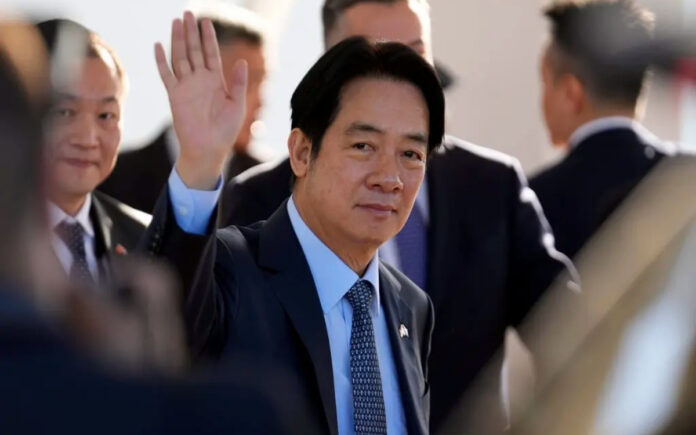Beijing/Taipei: Taiwan President Lai Ching-te is accused by the Chinese government of escalating tensions with “sinister intentions” ahead of a keynote speech he is set to deliver in Taipei, which could provoke a military response from China. Lai, who assumed office in May after winning the January election, is viewed unfavorably by China, which labels him a “separatist.” Beijing considers Taiwan—governed democratically—to be a part of its territory, a claim that Lai and his administration firmly reject.
In a statement responding to comments Lai made over the weekend, in which he asserted it is “impossible” for the People’s Republic of China to be Taiwan’s motherland due to Taiwan’s older political roots, China’s Taiwan Affairs Office stated that he is “confusing right from wrong.” The office criticized Lai for promoting the idea that the two sides of the Taiwan Strait represent separate countries. “Lai Ching-te’s Taiwan independence fallacy is just old wine in a new bottle, and again exposes his obstinate stance on Taiwan independence and his sinister intentions of escalating hostility and confrontation,” it added.
Lai is scheduled to deliver his main national day speech on Thursday, which commemorates the overthrow of the last Chinese dynasty in 1911 and the establishment of the Republic of China. After losing a civil war to Mao Zedong’s communists in 1949, the defeated republican government retreated to Taiwan, which continues to be referred to as the Republic of China.
Taiwan’s Mainland Affairs Council stated that since 1949, the People’s Republic of China has never ruled the island, emphasizing that the Taiwan Affairs Office’s remarks clarify the Chinese communists’ belief that they are the sole legitimate government of China, leaving no room for the Republic of China.
In anticipation of Lai’s speech, Taiwanese officials suggest that China may conduct military drills near Taiwan to exert pressure and reinforce its sovereignty claims.
Also Read | Tensions Rise as North Korea Holds Supreme People’s Assembly Session
Chinese Military Exercises
A U.S. State Department spokesperson stated they could not speculate on China’s actions but emphasized that using annual celebrations or public remarks as a pretext for provocative measures undermines peace and stability.
China’s defense ministry reiterated its opposition to U.S. arms sales to Taiwan after the Biden administration approved an additional $567 million in defense support. “What needs stressing is that arming Taiwan encourages Taiwan independence, and Taiwan independence means war,” the ministry stated, echoing previous sentiments.
China’s military conducts operations almost daily around Taiwan, regularly engaging in what Taiwan refers to as “joint combat readiness patrols,” with the most recent occurring on Sunday. In recent weeks, China has also conducted various drills, including joint operations with Russia in the Western Pacific and the test-firing of an intercontinental ballistic missile last month.
Also Read | North Korean Army to Sever All Road and Rail Links with South Korea
Taiwan’s defense ministry informed Reuters that China has been using various justifications to “legitimize its targeted military drills.” “We continue to monitor and analyze the training dynamics of the Chinese communists around the Taiwan Strait to anticipate the situation,” the ministry added.
Lai asserts that only the people of Taiwan can decide their future and has repeatedly offered to engage in talks with Beijing, only to be met with rejection. Following Lai’s inauguration in May, China staged “punishment” war games around Taiwan.



